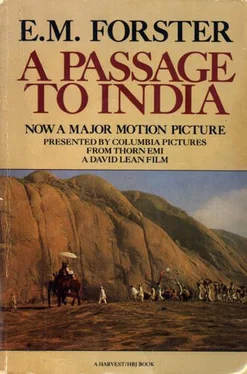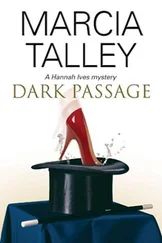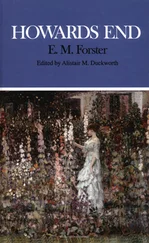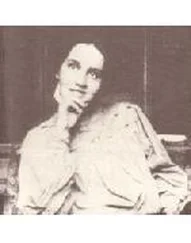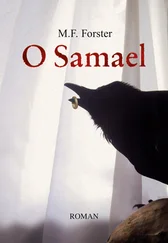"It simply doesn't affect me. Spies are as thick as mosquitoes, but it's years before I shall meet the one that kills me. You've something else in your mind."
"I've not; don't be ridiculous."
"You have. You're cross with me about something or other."
Any direct attack threw him out of action. Presently he said: "So you and Madamsell Adela used to amuse one another in the evening, naughty boy."
Those drab and high-minded talks had scarcely made for dalliance. Fielding was so startled at the story being taken seriously, and so disliked being called a naughty boy, that he lost his head and cried: "You little rotter! Well, I'm damned. Amusement indeed. Is it likely at such a time?"
"Oh, I beg your pardon, I'm sure. The licentious Oriental imagination was at work," he replied, speaking gaily, but cut to the heart; for hours after his mistake he bled inwardly.
"You see, Aziz, the circumstances… also the girl was still engaged to Heaslop, also I never felt…"
"Yes, yes; but you didn't contradict what I said, so I thought it was true. Oh dear, East and West. Most misleading. Will you please put your little rotter down at his hospital?"
"You're not offended?"
"Most certainly I am not."
"If you are, this must be cleared up later on."
"It has been," he answered, dignified. "I believe absolutely what you say, and of that there need be no further question."
"But the way I said it must be cleared up. I was unintentionally rude. Unreserved regrets."
"The fault is entirely mine."
Tangles like this still interrupted their intercourse. A pause in the wrong place, an intonation misunderstood, and a whole conversation went awry. Fielding had been startled, not shocked, but how convey the difference? There is always trouble when two people do not think of sex at the same moment, always mutual resentment and surprise, even when the two people are of the same race. He began to recapitulate his feelings about Miss Quested. Aziz cut him short with: "But I believe you, I believe. Mohammed Latif shall be severely punished for inventing this."
"Oh, leave it alone, like all gossip—it's merely one of those half-alive things that try to crowd out real life. Take no notice, it'll vanish, like poor old Mrs. Moore's tombs."
"Mohammed Latif has taken to intriguing. We are already much displeased with him. Will it satisfy you if we send him back to his family without a present?"
"We'll discuss M.L. at dinner."
His eyes went clotted and hard. "Dinner. This is most unlucky—I forgot. I have promised to dine with Das."
"Bring Das to me."
"He will have invited other friends."
"You are coming to dinner with me as arranged," said Fielding, looking away. "I don't stand this. You are coming to dinner with me. You come."
They had reached the hospital now. Fielding continued round the Maidan alone. He was annoyed with himself, but counted on dinner to pull things straight. At the post office he saw the Collector. Their vehicles were parked side by side while their servants competed in the interior of the building. "Good morning; so you are back," said Turton icily. "I should be glad if you will put in your appearance at the club this evening."
"I have accepted re-election, sir. Do you regard it as necessary I should come? I should be glad to be excused; indeed, I have a dinner engagement this evening."
"It is not a question of your feelings, but of the wish of the Lieutenant-Governor. Perhaps you will ask me whether I speak officially. I do. I shall expect you this evening at six. We shall not interfere with your subsequent plans."
He attended the grim little function in due course. The skeletons of hospitality rattled—" Have a peg, have a drink." He talked for five minutes to Mrs. Blakiston, who was the only surviving female. He talked to McBryde, who was defiant about his divorce, conscious that he had sinned as a sahib. He talked to Major Roberts, the new Civil Surgeon; and to young Milner, the new City Magistrate; but the more the club changed, the more it promised to be the same thing. "It is no good," he thought, as he returned past the mosque, "we all build upon sand; and the more modern the country gets, the worse'll be the crash. In the old eighteenth century, when cruelty and injustice raged, an invisible power repaired their ravages. Everything echoes now; there's no stopping the echo. The original sound may be harmless, but the echo is always evil." This reflection about an echo lay at the verge of Fielding's mind. He could never develop it. It belonged to the universe that he had missed or rejected. And the mosque missed it too. Like himself, those shallow arcades provided but a limited asylum. "There is no God but God" doesn't carry us far through the complexities of matter and spirit; it is only a game with words, really, a religious pun, not a religious truth.
He found Aziz overtired and dispirited, and he determined not to allude to their misunderstanding until the end of the evening; it would be more acceptable then. He made a clean breast about the club—said he had only gone under compulsion, and should never attend again unless the order was renewed. "In other words, probably never; for I am going quite soon to England."
"I thought you might end in England," he said very quietly, then changed the conversation. Rather awkwardly they ate their dinner, then went out to sit in the Mogul garden-house.
"I am only going for a little time. On official business. My service is anxious to get me away from Chandrapore for a bit. It is obliged to value me highly, but does not care for me. The situation is somewhat humorous."
"What is the nature of the business? Will it leave you much spare time?"
"Enough to see my friends."
"I expected you to make such a reply. You are a faithful friend. Shall we now talk about something else?"
"Willingly. What subject?"
"Poetry," he said, with tears in his eyes. " Let us discuss why poetry has lost the power of making men brave. My mother's father was also a poet, and fought against you in the Mutiny. I might equal him if there was another mutiny. As it is, I am a doctor, who has won a case and has three children to support, and whose chief subject of conversation is official plans."
"Let us talk about poetry." He turned his mind to the innocuous subject. "You people are sadly circumstanced. Whatever are you to write about? You cannot say, 'The rose is faded,' for evermore. We know it's faded. Yet you can't have patriotic poetry of the 'India, my India' type, when it's nobody's India."
"I like this conversation. It may lead to something interesting."
"You are quite right in thinking that poetry must touch life. When I knew you first, you used it as an incantation."
"I was a child when you knew me first. Everyone was my friend then. The Friend: a Persian expression for God. But I do not want to be a religious poet either."
"I hoped you would be."
"Why, when you yourself are an atheist?"
"There is something in religion that may not be true, but has not yet been sung."
"Explain in detail."
"Something that the Hindus have perhaps found."
"Let them sing it."
"Hindus are unable to sing."
"Cyril, you sometimes make a sensible remark. That will do for poetry for the present. Let us now return to your English visit."
"We haven't discussed poetry for two seconds," said the other, smiling.
But Aziz was addicted to cameos. He held the tiny conversation in his hand, and felt it epitomized his problem. For an instant he recalled his wife, and, as happens when a memory is intense, the past became the future, and he saw her with him in a quiet Hindu jungle native state, far away from foreigners. He said: " I suppose you will visit Miss Quested."
"If I have time. It will be strange seeing her in Hampstead."
Читать дальше
